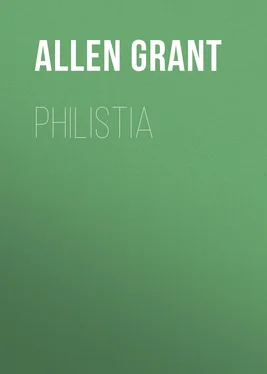Grant Allen - Philistia
Здесь есть возможность читать онлайн «Grant Allen - Philistia» — ознакомительный отрывок электронной книги совершенно бесплатно, а после прочтения отрывка купить полную версию. В некоторых случаях можно слушать аудио, скачать через торрент в формате fb2 и присутствует краткое содержание. Жанр: foreign_prose, literature_19, foreign_antique, на английском языке. Описание произведения, (предисловие) а так же отзывы посетителей доступны на портале библиотеки ЛибКат.
- Название:Philistia
- Автор:
- Жанр:
- Год:неизвестен
- ISBN:нет данных
- Рейтинг книги:5 / 5. Голосов: 1
-
Избранное:Добавить в избранное
- Отзывы:
-
Ваша оценка:
- 100
- 1
- 2
- 3
- 4
- 5
Philistia: краткое содержание, описание и аннотация
Предлагаем к чтению аннотацию, описание, краткое содержание или предисловие (зависит от того, что написал сам автор книги «Philistia»). Если вы не нашли необходимую информацию о книге — напишите в комментариях, мы постараемся отыскать её.
Philistia — читать онлайн ознакомительный отрывок
Ниже представлен текст книги, разбитый по страницам. Система сохранения места последней прочитанной страницы, позволяет с удобством читать онлайн бесплатно книгу «Philistia», без необходимости каждый раз заново искать на чём Вы остановились. Поставьте закладку, и сможете в любой момент перейти на страницу, на которой закончили чтение.
Интервал:
Закладка:
Arthur looked at him gently and smiled, but said nothing.
'Will you tell me about her, Artie?' asked the old man, caressingly, laying his hand upon his son's arm.
'Not now, Father; not just now, please. Some other time, perhaps, but not now. I hardly know about it myself, yet. It may be something—it may be nothing; but, at any rate, it was peg enough to hang a fantasia upon. You've surprised my little secret, Father, and I dare say it's no real secret at all, but just a passing whiff of fancy. If it ever comes to anything, you shall know first of all the world about it. Now take out your violin, there's a dear old Dad, and give me a tune upon it.'
The father took the precious instrument from its carefully covered case with a sort of loving reverence, and began to play a piece of Arthur's own composition. From the moment the bow touched the chords it was easy enough to see whence the son got his musical instincts. Old George Berkeley was a born musician, and he could make his violin discourse to him with rare power of execution. There they sat, playing and talking at intervals, till nearly eight, when Arthur went out hurriedly to catch the last train to Oxford, and left the old shoemaker once more to his week's solitude. 'Not for much longer,' the curate whispered to himself, as he got into his third-class carriage quickly; 'not for much longer, if I can help it. A curacy in or near London's the only right thing for me to look out for!'
CHAPTER VII
GHOSTLY COUNSEL
November came, and with it came the Pembroke fellowship examination. Ernest went in manfully, and tried hard to do his best; for somehow, in spite of the immorality of fellowships, he had a sort of floating notion in his head that he would like to get one, because he was beginning to paint himself a little fancy picture of a home that was to be, with a little fairy Edie flitting through it, and brightening it all delightfully with her dainty airy presence. So he even went so far as to mitigate considerably the native truculence of his political economy paper, after Edie's advice—not, of course, by making any suggestion of opinions he did not hold, but by suppressing the too-prominent expression of those he actually believed in. Max Schurz's name was not once mentioned throughout the whole ten or twelve pages of closely written foolscap; 'Gold and the Proletariate' was utterly ignored; and in place of the strong meat served out for men by the apostles of socialism in the Marylebone dancing-saloon, Ernest dished up for his examiner's edification merely such watery milk for babes as he had extracted from the eminently orthodox economical pages of Fawcett, Mill, and Thorold Rogers. He went back to his rooms, satisfied that he had done himself full justice, and anxiously waited for the result to be duly announced on the Saturday morning.
Was it that piece of Latin prose, too obviously modelled upon the Annals of Tacitus, while the senior tutor was a confirmed Ciceronian, with the Second Philippic constitutionally on the brain? Was it the Greek verse, containing one senarius with a long syllable before the caesura in the fifth foot, as Herbert pointed out to his brother on the very evening when that hideous oversight—say rather crime—had been openly perpetrated in plain black and white on a virgin sheet of innocent paper? Was it some faint ineffaceable savour of the Schurzian economics, peeping through in spite of all disguises, like the garlic in an Italian ragout, from under the sedulous cloak of Ricardo's theory of rent? Was it some flying rumour, extra-official, and unconnected with the examination in any way, to the effect that young Le Breton was a person of very dubious religious, political, and social orthodoxy? Or was it merely that fortunate dispensation of Providence whereby Oxford almost invariably manages to let her best men slip unobserved through her fingers, and so insures a decent crop of them to fill up her share of the passing vacancies in politics, literature, science, and art? Heaven or the Pembroke examiners alone can answer these abstruse and difficult questions; but this much at least is certain, that when Ernest Le Breton went into the Pembroke porter's lodge on the predestined Saturday, he found another name than his placarded upon the notice board, and turned back, sick at heart and disappointed, to his lonely lodgings. There he spent an unhappy hour or two, hewing down what remained of his little aerial castle off-hand; and then he went out for a solitary row upon the upper river, endeavouring to work off his disappointment like a man, with a good hard spell of muscular labour.
Edie had already returned to Calcombe-Pomeroy, so in the evening he went to tell his misfortune to Harry Oswald. Harry was really sorry to hear it, for Ernest was his best friend in Oxford, and he had hoped to have him settled close by. 'You'll stop up and try again for Christ Church in February, won't you, Le Breton?' he asked.
'No,' said Ernest, shaking his head a little gloomily; 'I don't think I will. It's clear I'm not up to the Oxford standard for a fellowship, and I couldn't spend another term in residence without coming down upon my mother to pay my expenses—a thing she can't easily afford to do. So I suppose I must fall back for the present upon the Exmoor tutorship. That'll give me time to look about me, till I can get something else to do; and after all, it isn't a bit more immoral than a fellowship, when one comes to look it fairly in the face. However, I shall go first and ask Herr Max's opinion upon the matter.'
'I'm going to spend a fortnight in town in the Christmas vac,' said Oswald, 'and I should like to go with you to Max's again, if I may.'
Ernest coloured up a little, for he would have liked to invite Oswald to his mother's house; and yet he felt there were two reasons why he should not do so; he must himself be dependent this time upon his mother's hospitality, and he didn't think Lady Le Breton would be perfectly cordial in her welcome to Harry Oswald.
In the end, however, it was arranged that Harry should engage rooms at his former lodgings in London, and that Ernest should take him once more to call upon the old socialist when he went to consult him on the question of conscience.
'For my part, Ernest,' said Lady Le Breton to her son, the morning after his return from Oxford, 'I'm not altogether sorry you didn't get this Pembroke fellowship. It would have kept you among the same set you are at present mixing in for an indefinite period. Of course now you'll accept Lady Exmoor's kind proposal. I saw her about it the same morning we got Hilda's letter; and she offers 200L. a year, which, of course, is mere pocket money, as your board and lodging are all found for you, so to speak, and you'll have nothing to do but to dress and amuse yourself.'
'Well, mother, I shall see about it. I'm going to consult Herr Schurz upon the subject this morning.'
'Herr Schurz!' said Lady Le Breton, in her bitterest tone of irony. 'It appears to me you make that snuffy old German microscope man your father confessor. It's very disagreeable to a mother to find that her sons, instead of taking her advice about what is most material to their own interests, should invariably go to confer with communist refugees and ignorant ranters. Ronald, what is your programme, if you please, for this morning's annoyance?'
Ronald, with the fear of the fifth commandment steadily before his eyes, took no notice of the last word, and answered calmly, 'You know, mother, this is the regular day for the mission-house prayer-meeting.'
'The mission-house prayer-meeting! I know nothing of the sort, I assure you. I don't keep a perfect calendar in my mind of all your meetings and your religious engagements. Then I suppose I must go alone to the Waltons' to see Mr. Walton's water-colours?'
Читать дальшеИнтервал:
Закладка:
Похожие книги на «Philistia»
Представляем Вашему вниманию похожие книги на «Philistia» списком для выбора. Мы отобрали схожую по названию и смыслу литературу в надежде предоставить читателям больше вариантов отыскать новые, интересные, ещё непрочитанные произведения.
Обсуждение, отзывы о книге «Philistia» и просто собственные мнения читателей. Оставьте ваши комментарии, напишите, что Вы думаете о произведении, его смысле или главных героях. Укажите что конкретно понравилось, а что нет, и почему Вы так считаете.












